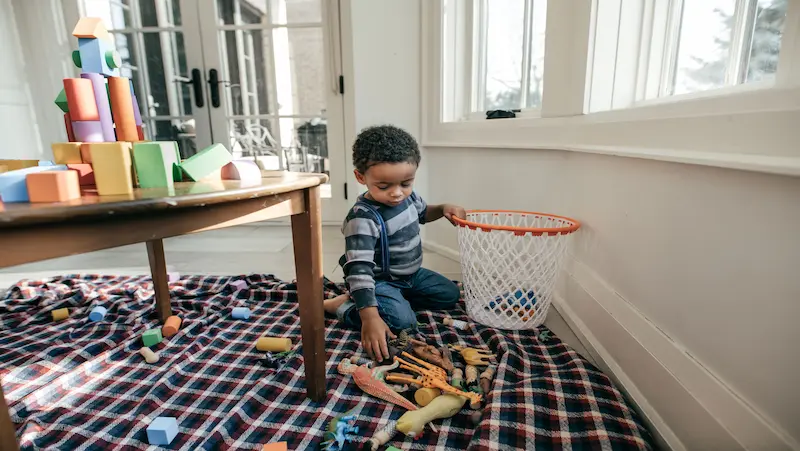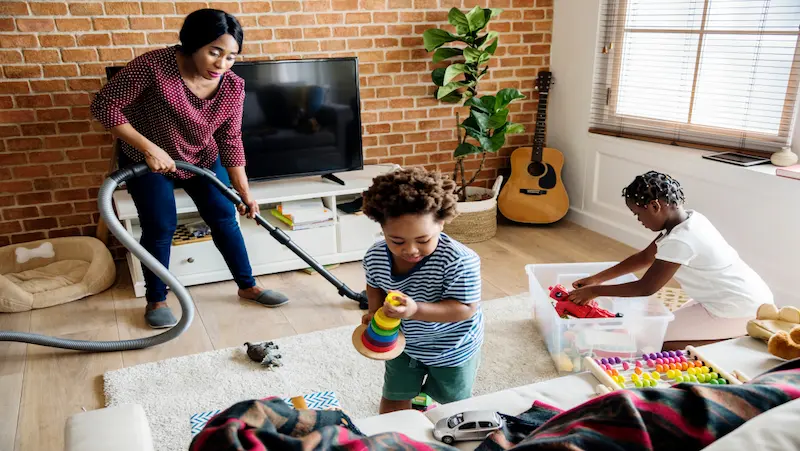Are you looking for ways to instill a sense of responsibility in your kids while making chores enjoyable? Look no further!
Engaging chores for kids can be a fantastic way to foster responsibility and fun simultaneously. By involving your children in age-appropriate tasks, you can teach them important life skills while creating a positive experience. Tasks such as setting the table, organizing toys, watering plants, or helping with laundry can be transformed into exciting games or challenges.
Encourage creativity and offer rewards or incentives to make the process more enjoyable. By incorporating responsibility into their routine in a fun way, you’ll be setting your children up for success in the future.
Table of contents
Introduction
Assigning chores to kids is crucial for child development and overall well-being. By participating in household tasks, children learn valuable life skills, such as responsibility, time management, and teamwork. It is one of the best activities for kids teach them the importance of contributing to the family unit and developing a strong work ethic.
Additionally, kids gain a sense of accomplishment and self-confidence as they successfully complete tasks. Chores also instill discipline and accountability, preparing children for future responsibilities.
Furthermore, engaging in chores as a family fosters a sense of togetherness and strengthens bonds. Few of us enjoy doing them, but for a household to run smoothly these tedious and time-consuming tasks must get done. It’s a given that the adults will do their part around the house, but when it comes to assigning housework to children, there’s some debate.
Many parents want to preserve childhood for as long as possible, letting the “kids be kids” and enjoy plenty of playtimes while they’re still young. Others may see children as less capable, preferring to finish the housework as quickly as possible. These arguments make sense, but they also overlook the many positive benefits of giving kids chores.
Overall, assigning chores to kids not only helps lighten the load for parents but also equips children with essential skills and values that will serve them well throughout their lives.
Age-appropriate chores
Your child may be able to do more than you think, “keep in mind that a child who has mastered a complicated computer game can easily run the dishwasher”, Pantley says.
In general, she says, preschoolers can handle one or two simple one-step jobs. Older children can manage more. Here are her pointers on kids chores by age:
Chores for children ages 2 to 3:
- Put toys away.
- Fill the pet’s food dish.
- Wipe up spills.
- Dust.
- Put clothes in the hamper.
Chores for children 4 to 5:
- Any of the above chores, plus:
- Making their bed.
- Clear table.
- Empty wastebaskets.
- Pull weeds, if you have a garden.
- Water flowers.
- Fix a bowl of cereal.
- Unload utensils from the dishwasher.
- Wash plastic dishes at the sink.
- Use a hand-held vacuum to pick up crumbs.
Chores for children ages 6 to 7:
Any of the above chores, plus:
- Sort laundry.
- Weed and rake leaves.
- Keep the bathroom tidy.
- Help make and pack lunch.
- Set and clear table.
- Sweeping floors.

Chores for children from ages 8 to 9:
Any of the above chores, plus:
- Load the dishwasher.
- Sew buttons.
- Vacuum.
- Help make dinner.
- Make your own breakfast.
- Mop floor.
- Peel vegetables.
- Take the pet for a walk.
- Put away laundry.
Chores for children ages 10 and older:
Any of the above chores, plus:
- Do laundry.
- Iron clothes.
- Clean kitchen.
- Baby-sit younger siblings.
- Unload the dishwasher.
- Change the bed sheets.
- Wash cars.
- Wash windows.
- Clean bathroom.
Developing Life Skills through Chores
a. Time management.
Teens juggling school, sports, clubs, part-time jobs, and social life may try to convince you that they don’t have time for housework. Learning to handle responsibilities that blend “work” and “pleasure” might, nevertheless, be essential to successful time management. If tasks are non-negotiable, children will find a way to fit them into their hectic schedules.
b. Teamwork
Whether they’re washing the car as a team or scrubbing the bathroom together, kids can learn valuable lessons about getting along with family members. Including kids in household tasks can help teach kids the value of teamwork.
c. Responsibilities.
As your kids and teens take on chores, they can learn about the importance of being responsible. As a parent, you might help your kids understand the importance of owning up to their mistakes and helping out when they drop the ball. Being responsible for chores and mistakes can help your kids learn accountability and the importance of feeling ownership for their actions.
d. Budgeting
When your children receive an allowance for tasks, they may learn how to save and budget for what they want to buy. If a chore-based allowance is not part of your approach, you might teach children about money through entertaining duties such as taking them through food shopping to compare prices.
e. Good work habits
As kids and teens learn how to complete household tasks, they develop good habits for kids. Many household tasks require attention to detail, which is why your kids will develop a work ethic that can help them succeed in their future careers.

Making Chores Fun and Engaging
A. Give them their own cleaning equipment
Give your child a bucket and stickers and ask them to create their own personalized cleaning caddy. Put their name on it and fill it with all the cleaning things they need like dust rags, sponges, and paper towels. It will help them be more motivated to do their bit when they know they have their own stuff to use. The bonus point is, it will act as a great stress management for kids .
B. Turn chores into a game
Everything is more fun when it’s turned into a game. Cut some paper into strips and color one end. Each color represents a particular chore. When your kids pick a strip, they get to do that chore. You could add random fun tasks. You can also make picking up soft toys into a basketball game by getting the kids to shoot them into a storage container.
C. work as a team
Working together as a team can make chores much more fun. Build family chore time into your routine. For instance, set a 10-minute time after dinner and get everyone to race to tidy up as much as possible before the time runs out. Everyone pitching in together makes doing chores fun and a chance to bond as a family.
D. Blast some tunes
Take in turns to be the DJ and pick some songs to listen to while you can and tidy. You could even get your kids to help make a cleaning soundtrack with all their favorite songs to listen to as they do their tasks. You could even throw in a mini dancing competition too.
E. Reward with pocket money
Pocket money is a great way to motivate children to do chores. It gets them into a habit of working to earn money and understanding the value of completing a task properly. If you decide to give your children money, make sure they understand how much they will get for each chore.
Turning chores into games or incorporating music and rewards can make the tasks more enjoyable and engaging for kids. Here are some tips to make chores fun:
1. Time-based challenges: Set a timer and challenge your kids to complete a task within a specific time limit. Turn it into a race and see who finishes first. This adds excitement and a sense of urgency to the chore.
2. Chore charts with stickers: Create a colorful chore chart and let your kids earn stickers or stamps for each completed task. Set goals and reward them with a special treat or privilege once they reach a certain number of stickers.
3. Music and dance: Play upbeat music while doing chores and encourage your kids to dance or sing along. This creates a lively atmosphere and helps pass the time quickly.
4. Role-playing: Assign different roles or characters to each family member during chores. For example, pretend to be superheroes saving the house from mess or pirates on a cleaning quest. This adds imagination and creativity to the tasks.
5. Chore lotteries: Write down different rewards or small surprises on pieces of paper and place them in a jar. Let your kids pick a paper after completing a chore. The anticipation of a surprise can motivate them to finish their tasks.
6. Teamwork and cooperation: Turn chores into a team effort by assigning tasks that require collaboration. For instance, have your kids work together to set the table or clean a room. This fosters a sense of unity and makes the chores more enjoyable.
Remember to tailor these ideas to your children’s ages and preferences. By making chores fun and incorporating elements of play, you can encourage their participation, instill responsibility, and create a positive association with household tasks.

Establishing a Chore Systems
Creating a chore system is essential for tracking your kids’ progress and ensuring consistency. Here’s guidance on establishing a chore chart or system:
1. Identify age-appropriate tasks: Consider your children’s ages, capabilities, and interests when assigning chores. Select tasks they can handle independently and gradually increase the difficulty as they grow.
2. Make a chore chart: Create a visual representation of the chores and their assigned responsibilities. You can use a whiteboard, poster, or printable chore chart template. Divide the chart into sections, assigning tasks to each child.
3. Set a schedule: Determine the frequency and timing of the chores. Decide if they will be daily, weekly, or monthly tasks, and clearly communicate the schedule to your children.
4. Clear instructions: Provide explicit instructions for each chore. Break down the task into smaller steps, and demonstrate or explain how to complete them. Ensure your children understand what is expected of them.
5. Consistency is key: Stick to the chore system consistently. Establish a routine and hold your children accountable for their assigned tasks. Consistency helps develop discipline and reinforces the importance of responsibility.
6. Celebrate progress: Acknowledge and praise your children’s efforts when they complete their chores. Positive reinforcement goes a long way in motivating them to continue their responsibilities.
7. Adjust as needed: Regularly assess the chore system to ensure it aligns with your children’s abilities and the evolving needs of your household. Modify or add tasks as necessary.
Remember to communicate openly with your children about the chore system, explaining its purpose and benefits. Involving them in the process and allowing them to have a say in their assigned tasks can also increase their engagement and motivation.

Encouraging Responsibilities
Motivating and encouraging kids to take ownership of their chores is key to instilling a sense of responsibility. Here’s actionable advice to achieve this:
1. Explain the importance: Communicate to your children why their chores matter. Discuss how their contributions help the family and the positive impact it has on their own growth and development.
2. Give autonomy and choice: Allow your kids to have some control over their chores. Offer options within their age-appropriate tasks, giving them a sense of ownership and responsibility for their decisions.
3. Set achievable goals: Break down larger chores into smaller, manageable tasks. Encourage your children to set goals and celebrate their achievements when they complete each step. This boosts their motivation and builds a sense of accomplishment.
4. Provide positive reinforcement: Offer praise and rewards when your children consistently and responsibly complete their chores. This can be verbal recognition, extra privileges, or small incentives that motivate and reinforce their efforts.
5. Lead by example: Demonstrate responsibility in your own actions and chores. Children are more likely to adopt responsible behavior when they see their parents modeling it consistently.
6. Make it enjoyable: Incorporate elements of fun into chores, such as playing music, engaging in friendly competitions, or turning tasks into games. This fosters a positive attitude and makes chores more enjoyable for your kids.
7. Rotate and switch tasks: Avoid monotony by periodically rotating chores among family members. This prevents boredom and gives children exposure to different responsibilities, expanding their skill set.
Now, let’s discuss the benefits of instilling a sense of responsibility from an early age:
1. Life skills development: Responsibility learned through chores prepares children for adulthood. They acquire skills like time management, organization, and accountability that are essential for success in various aspects of life.
2. Self-confidence: Completing chores independently and being accountable for them builds self-confidence in children. They develop a sense of competence and belief in their abilities.
3. Work ethic: Instilling responsibility early helps children understand the value of hard work and instills a strong work ethic that will benefit them throughout their lives.
4. Teamwork and collaboration: Chores often require cooperation within a family unit. By participating in household tasks, children learn to work together, communicate, and collaborate effectively with others.
5. Respect for belongings and environment: Responsibility in chores teaches children to respect their belongings and the environment they live in. They learn the importance of cleanliness, organization, and taking care of shared spaces.
6. Independence and self-reliance: By taking ownership of their chores, children become more independent and self-reliant. They develop problem-solving skills and learn to take initiative in completing tasks without constant supervision.
Instilling responsibility from an early age sets a solid foundation for children’s personal and academic growth. It empowers them to become responsible, self-sufficient individuals who can contribute positively to their families, communities, and society as a whole.

Conclusion
In conclusion, engaging children in chores that foster responsibility and fun is a valuable investment in their development. By creating a chore system, providing clear instructions, and motivating them to take ownership, we can instill a sense of responsibility from an early age.
This not only equips children with essential life skills but also cultivates self-confidence, a strong work ethic, and the ability to collaborate. Moreover, the benefits extend beyond their individual growth, positively impacting family dynamics and promoting a sense of unity.
By making chores enjoyable and emphasizing the importance of responsibility, we empower our children to become capable, independent individuals prepared for the challenges of the future.
Know about coding for kids and more, to get your hands on more such educational and free resources on coding, robotics, game development, etc., do check out the Brightchamps Page now!
Frequently Asked Questions
There are various chores that kids can do as per their age which we have curated in the above blog. Check it out! Some of them being like –
● 6 to 7-year-olds can wipe tables and counters.
● 7 to 9-year-olds can load and unload the dishwasher.
● 10 to 11-year-olds can change their sheets.
Children who do chores may exhibit higher self-esteem, be more responsible, and be better equipped to deal with frustration, adversity, and delayed gratification.
They can learn skills by preparing meals, cleaning, organizing, and gardening.
Give them their own cleaning equipment, Turn chores into a game, blast some tunes, and reward them with some pocket money. To find more ideas, check it out above!
Separate daily and weekly chores, evaluate time needs and your daily schedule to build a functional daily chore list, and assign your least favorite chores first.
Providing rewards and incentives for completing chores can be an effective way to motivate children and reinforce positive behavior.
You can encourage your kids to take responsibility for their chores by explaining the importance, of offering autonomy and choice, providing positive reinforcement, and leading by example.


 We are an army of educators and passionate learners from BrightChamps family, committed to providing free learning resources to kids, parents & students.
We are an army of educators and passionate learners from BrightChamps family, committed to providing free learning resources to kids, parents & students.








